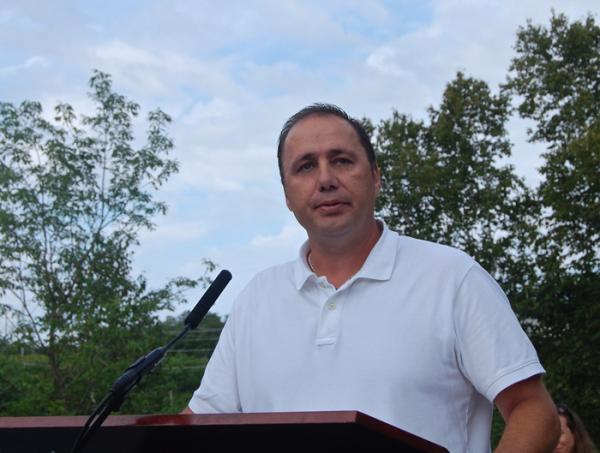Baby Veronica Ruling Heralds ‘Second Coming of a Termination Era’

When Penobscot Indian Nation leaders heard on July 17 that the South Carolina Supreme Court had ordered three-year-old Veronica Brown, a Cherokee citizen, removed from the care of her biological father and given to a non-Indian adoptive couple who had custody of her during her infancy, they were angry and distraught.
RELATED: Baby Veronica Must Return to Adoptive Parents
“This decision neither acknowledges congressional intent or the horrific past that caused these protections for our kids to be put in place to begin with,” Penobscot Chief Kirk Francis wrote in an e-mail to tribal colleagues and Indian Country Today Media Network. “This decision also tells me that all the rhetoric about tribal nations being recognized as sovereigns rings very hollow today after so much hope and optimism that we are making huge strides. … If we are truly recognized by this country as tribal nations then how can the most fundamental of our responsibilities be taken away from us and I am talking about our right to protect and nurture our citizens in a way that is conducive to our culture and identity for the very future of our Nations? I believe whole heartedly that we are seeing the second coming of a termination era.”
Donna Loring, a Penobscot council member, teacher, writer and former tribal representative to the Maine legislature, called for action. “I would love to see all the tribes in this country file a action in the world court together claiming an act of legally sanctioned genocide,” Loring said in an e-mail to ICTMN. In her last action as a legislator in 2008, Loring entered a resolution to endorse the UN Declaration on the Rights of Indigenous Peoples that was unanimously approved by the Maine House and Senate, making Maine the first state to pass such a resolution.
RELATED: Mixed Reviews on United Nations Declaration on the Rights of Indigenous Peoples’ Progress
Loring said the South Carolina ruling violates the Declaration. “We have a human right to exist and not be subject to having our children stolen and taken from us. It is in itself an act of genocide. The highest court in this country has sanctioned that action, where else are we going to go for justice and protection?”
RELATED: Supreme Court Thwarts ICWA Intent in Baby Veronica Case
The Penobscots and other Wabanaki people – the Passamaquoddy, Maliseets and Micmacs – in Maine have a long and brutal history with state-sanctioned “care” of Indian children. Indeed, Maine’s foster care system was Instrumental in the development of the Indian Child Welfare Act (ICWA). In 1974, the Maine Advisory Committee to the United States Commission on Civil Rights reported that Indian children in Maine were placed in foster care at a rate 16 times higher than anywhere else in the county. Only 4 of the 136 Indian children in foster care in Maine at that time were placed in Indian homes — homes which in some cases were built by the state but were then considered physically inadequate to meet state licensing standards for foster homes.
The report recommended, among other things, “That the U.S. Commission on Civil Rights initiate a national Indian foster care project to determine if there is massive deculturation of Indian children.” That recommendation led to the drafting of the Indian Child Welfare Act. It also eventually led to stories of the widespread physical and sexual abuse that Indian children suffered at the hands of white foster parents, and ultimately, to the creation of a Truth and Reconciliation Commission (TRC) in 2011. “The Wabanaki people were sensitive about this issue long before the [Baby Veronica case] started because of the horrific taking of our children,” Loring said.
Both Francis and Loring said race is front and center in the Veronica Brown case. Francis said he’s outraged that the media – before the most recent ruling – was able “to turn ICWA and tribes into racial bullies that are now the offenders for taking Indian children from prominent white families simply based on being Indian,“ Francis said. “That’s not only offensive and hypocritical but a human rights violation cloaked in interpreting [ICWA} contrary to how it’s been upheld in hundreds of court cases in multiple states.”
Loring cited the recent acquittal of George Zimmerman for the killing of African American teenager Trayvon Martin that sent thousands of African Americans into the streets to protest. “We need to take a lesson from our black brothers and sisters [and] form a really, really loud voice in unison with every tribe in this country and push our leaders to act. We cannot afford to allow these genocidal policies to be sanctioned unseen and unnoticed by the rest of world,” Loring said.
RELATED: Almost Trayvon: The Fear That Stalks Every Indian
The Veronica Brown case “keeps me up at night,” Francis said. He’ said the tribes must use “every available mechanism” to fight this battle and he’s willing to do whatever he can to help. But Francis said he’s certain of one thing: “If this kid was Penobscot, they would have to physically pry her from us.”
Read more at http://indiancountrytodaymedianetwork.com/2013/07/29/baby-veronica-ruling-heralds-second-coming-termination-era-150621